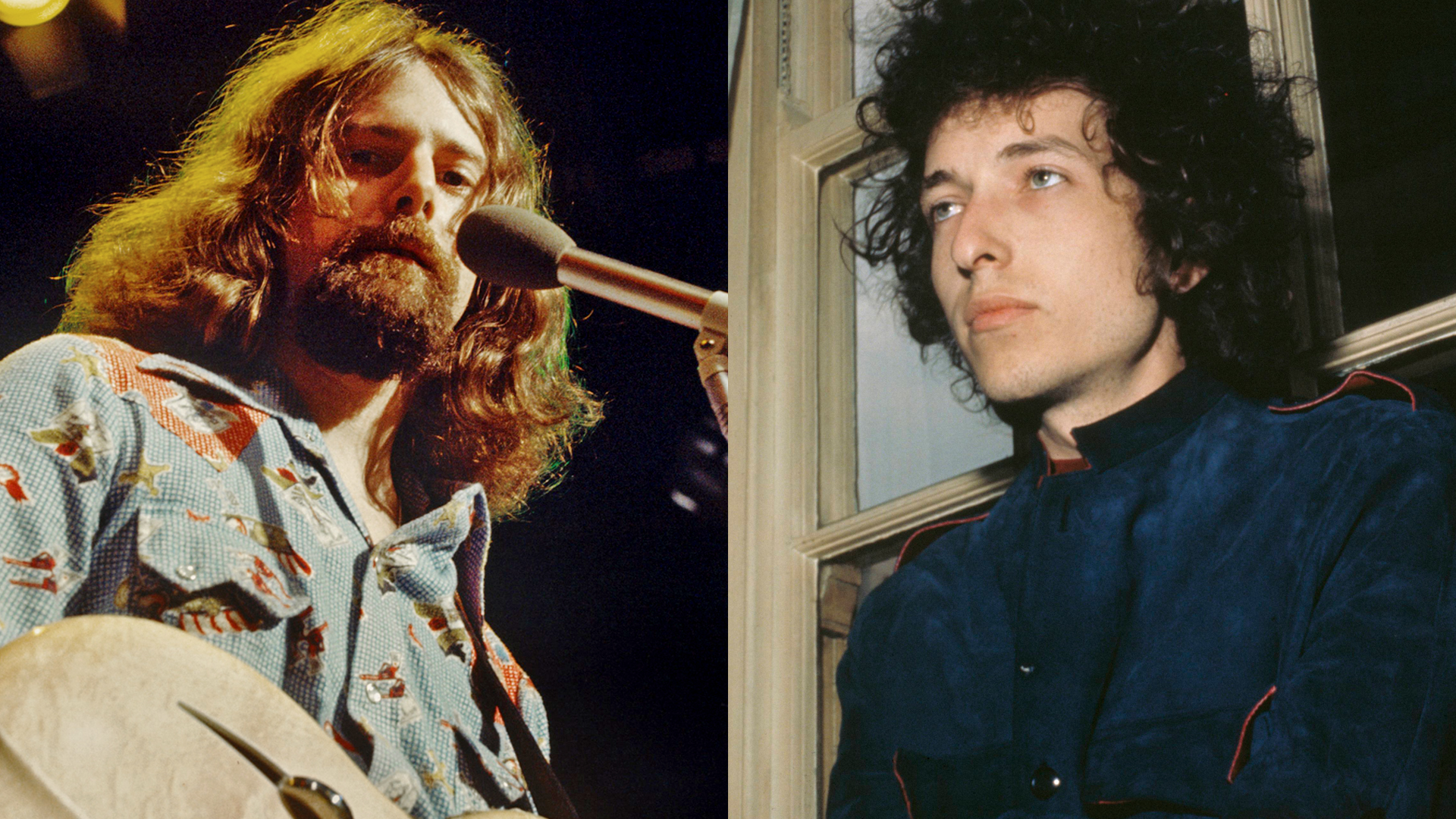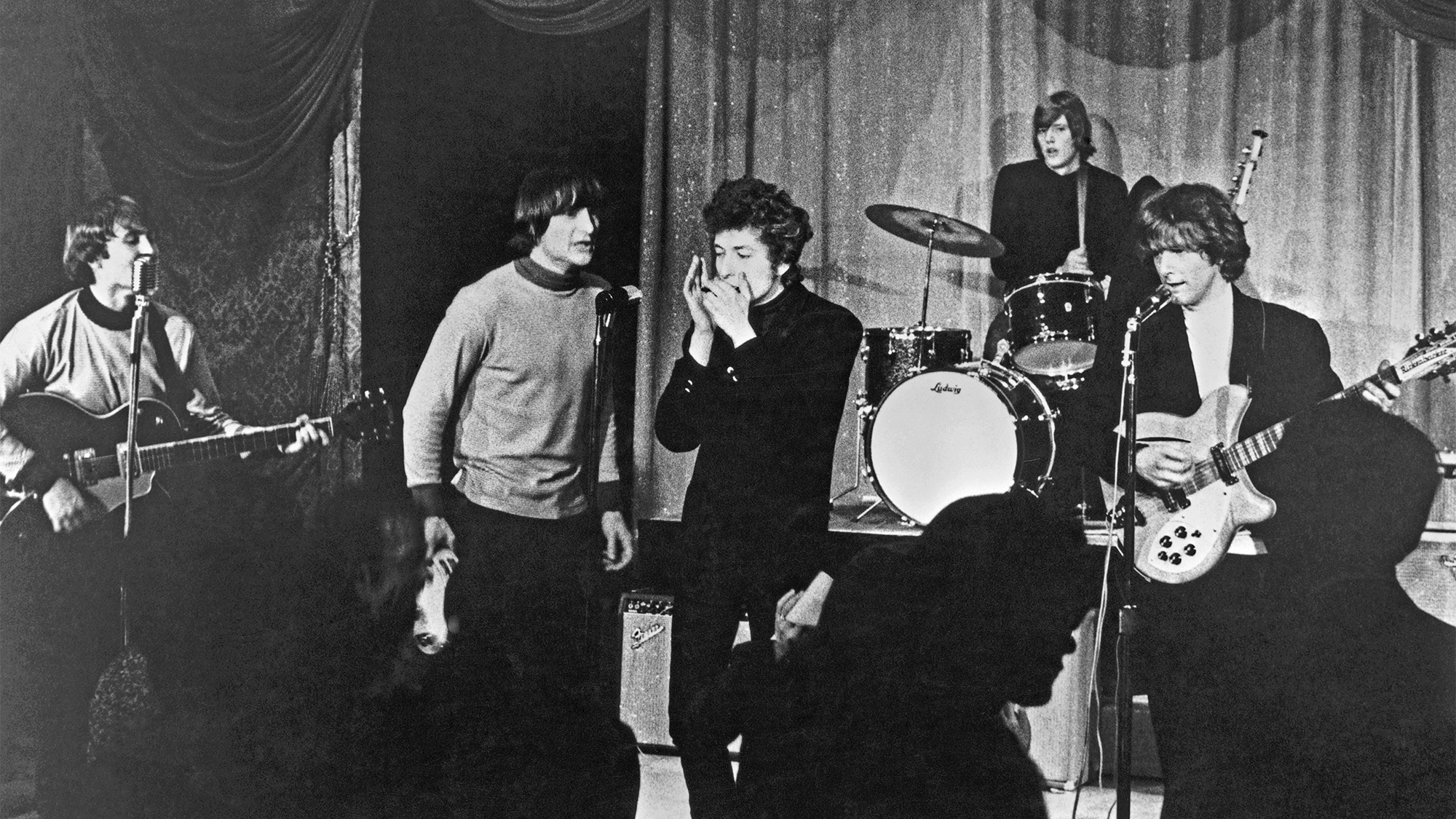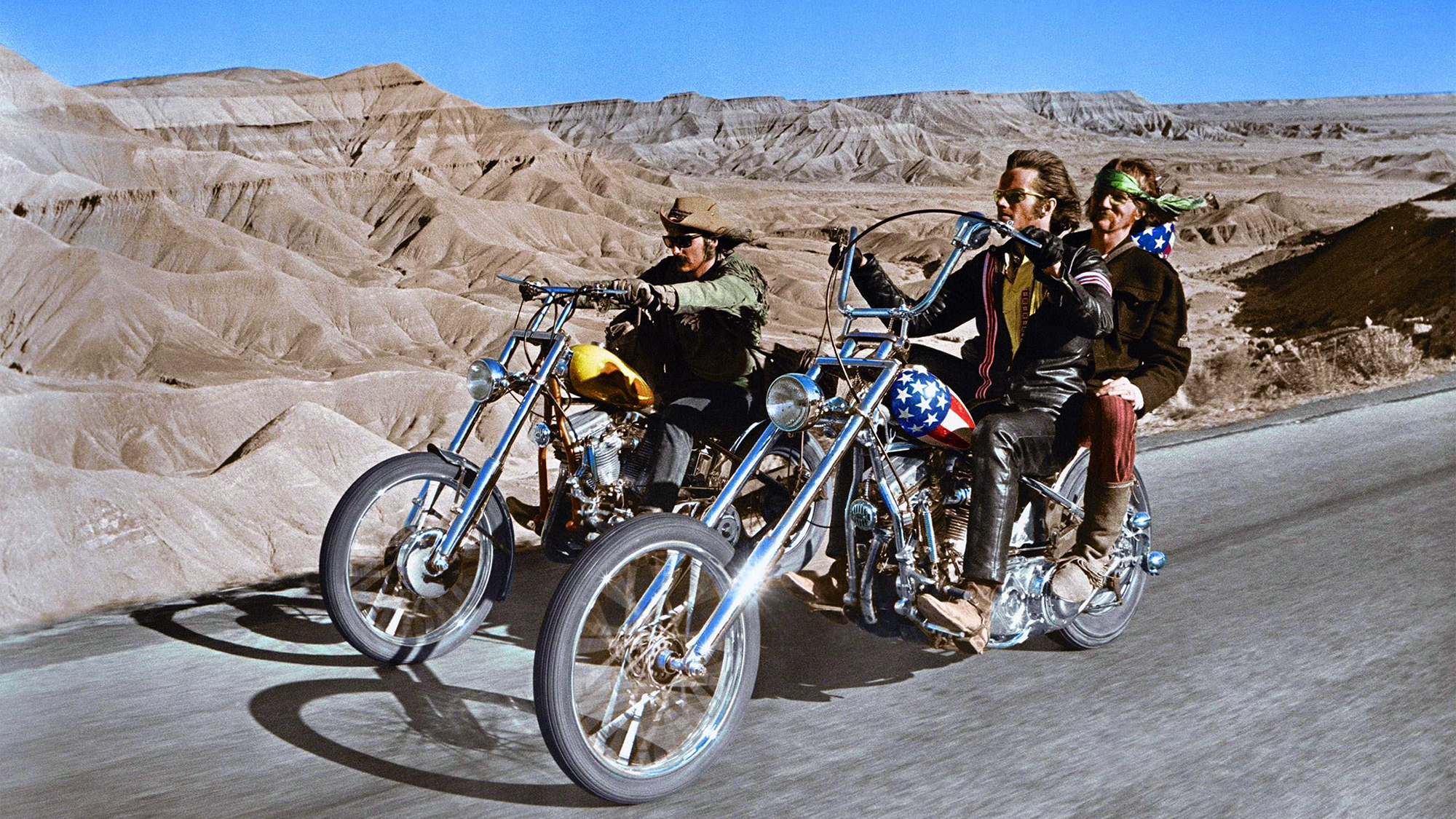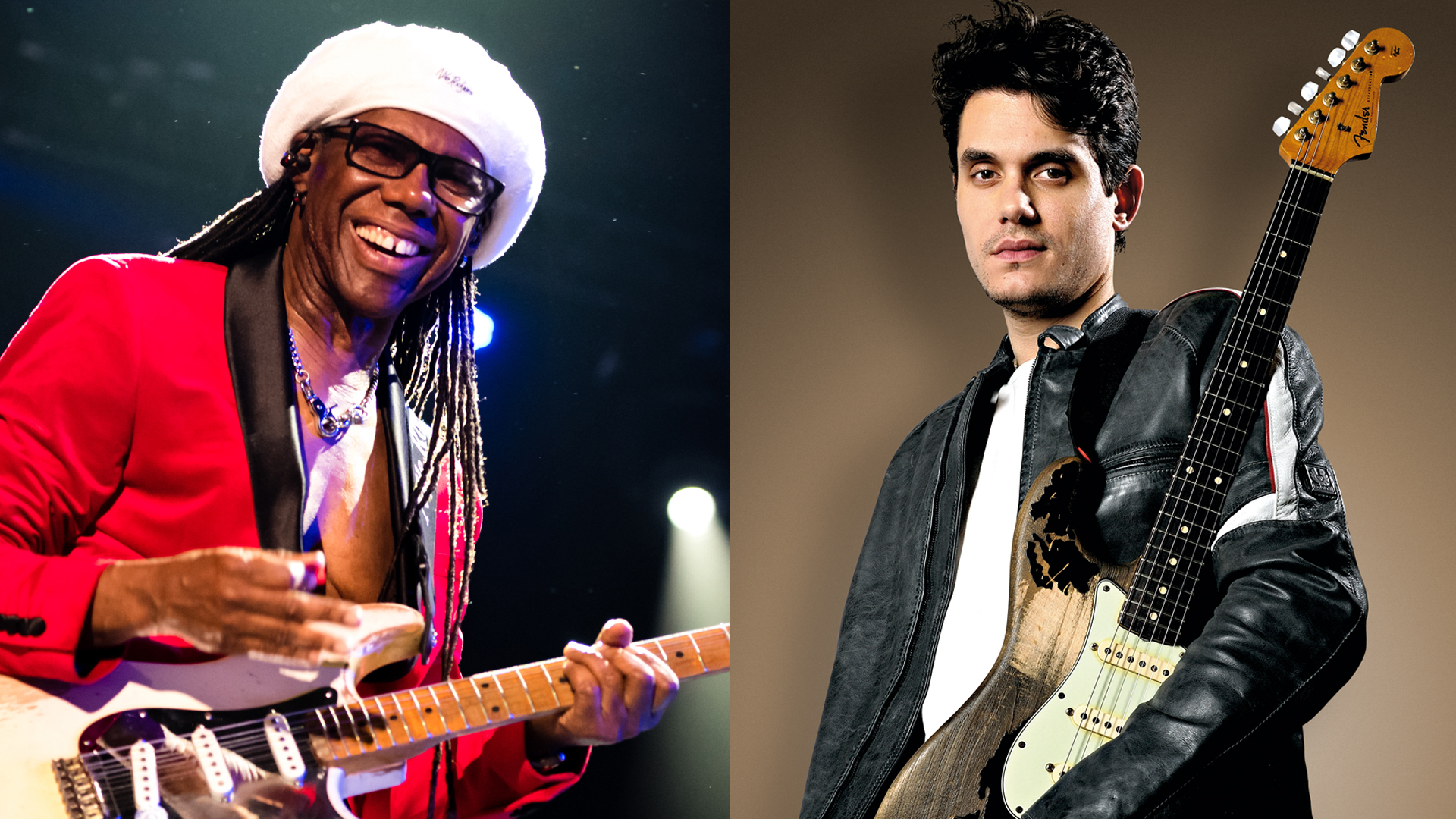“Dylan wrote down some notes on a paper napkin and said, ‘Give this to McGuinn. He’ll know what to do with it.’” Roger McGuinn says Bob Dylan wanted nothing to do with the 1969 anthem they wrote for a major film
The theme song for ‘Easy Rider’ has become a classic, but Dylan was unhappy with the film and refused to have his name associated with it

All the latest guitar news, interviews, lessons, reviews, deals and more, direct to your inbox!
You are now subscribed
Your newsletter sign-up was successful
When Roger McGuinn inadvertently co-wrote “The Ballad of Easy Rider” with Bob Dylan for the Easy Rider soundtrack in 1969, he couldn’t have known that he was writing an anthem for the counterculture.
Then again, given McGuinn’s carefree nature and association with the laid-back vibe of the late-1960s hippy movement, perhaps he had an inclination that the folky track would come to define one of cinema’s greatest soundtracks.
What’s more, the song came at a time when, save for 1967’s The Graduate, film soundtracks featured orchestral scores rather than contemporary music. Easy yet Rider’s soundtrack was punctuated with songs of the day by Steppenwolf, the Jimi Hendrix Experience, and McGuinn’s own group, the Byrds. To that end, his “Ballad of Easy Rider” drove home the point that Easy Rider was more than just another film — it was a work of art with a message.
McGuinn agrees. “I think it's great,” he tells Guitar Player. I love Steppenwolf, and it's really well done. You know, the songs they chose were really appropriate for the movie. And I thought the movie was a really good representation of the whole hippy thing, with LSD and pot.”
He used to come over to my house, and we’d play guitars and shoot pool. So he handed the verse to me as a surrogate, I guess.”
— Roger McGuinn
Of course, McGuinn wasn’t alone in putting together “The Ballad of Easy Rider.” He had help from Bob Dylan. The story goes that Peter Fonda — who co-wrote, co-produced and starred in the film — gave Dylan a private screening of Easy Rider in New York City, and asked him to write a theme for the movie.
Dylan didn’t like the film and was surprised to see it was a big-budget production. Rather than agree to write a song for it, he scrawled a verse on a napkin and told Fonda, “Give this to McGuinn. He’ll know what to do with it.”
Dylan’s response was characteristically cryptic, but he was right: McGuinn did know what to do with it. “I guess he knew I was able to take it and run with it,” McGuinn says with a shrug.
All the latest guitar news, interviews, lessons, reviews, deals and more, direct to your inbox!
As for why, McGuinn credits his friendship with the enigmatic songwriter. “He and I had been friends,” McGuinn says. “When I lived in Malibu, he used to come over to my house, and we’d play guitars and shoot pool. So he handed the verse to me as a surrogate, I guess.”

Once McGuinn finished the song, he, Fonda, Byrds drummer Gene Parsons and Dennis Hopper — Fonda’s cowriter and costar in Easy Rider, as well as its director — hit the studio at Columbia Records to cut the simple track, which features McGuinn on guitar and vocals, and Parsons on harmonica.
McGuinn says he never got to talk with Dylan to see if he liked the song, nor did he have input from him while writing it. All he had was his prior experience and a hunch about what would work.
“I wasn't really a prolific songwriter,” McGuinn says. “I had a whimsical attitude about writing songs. Gene Parsons had turned me on to sea shanties around that time.
“But I wasn't really trying to convey a big message or anything like that. I wasn't a protest songwriter. I just wrote songs that appealed to me.”
He called me up at about three o’clock in the morning a couple of weeks later. Bob said, ‘What’s this credit? I don’t need the money. You can take it off.’
— Roger McGuinn
Once he learned he’d received a songwriter credit for the song, Dylan insisted his name be taken off it. “He called me up at about three o’clock in the morning a couple of weeks later,” McGuinn says. “Bob said, ‘What’s this credit? I don’t need the money. You can take it off.’
“I said, ‘Okay.’ He didn’t want any association with it because he didn’t like the movie.”
Like most who participated in the making of Easy Rider, Dylan and McGuinn had no sense that the film and its music would become halcyon. But it did, and while Dylan may have disliked it, McGuinn is proud of their work and the film.
“We had no idea it was going to be a blockbuster,” McGuinn says. “But that’s the way it was.
“It was like the people who didn’t go to Woodstock, and then they saw what it became. I think Bob didn’t think it was going to be a successful movie and didn’t want his name associated with it. But people like it.”

You worked closely with Peter Fonda on Easy Rider. How did you two become friends?
I first met Peter back when I was working with Bobby Darin in Las Vegas. I used to do my 15-minute folk segment with him and then leave, and I’d walk up and down the strip in Vegas and go to different shows and stuff.
One night, Bobby said, “I’d like to take you out after the set, so stick around tonight because my wife and this young actor are coming over to see us, and it’s his first movie.”
So I stuck around, and [Darin’s wife, the film actress] Sandra Dee showed up with Peter Fonda. It turned out that Peter and I had a common friend, [Eugene] Stormy McDonald. Stormy had been a friend of mine since high school, and he was one of Peter’s best friends in college when they were in Tucson, Arizona. So that’s when I met Peter. It was around 1962, probably. And we maintained a friendship the whole time ever since then.
For the film, Peter wanted to use Bob Dylan’s “It’s Alright Ma (I’m Only Bleeding)” but couldn’t get copyright clearance, which led him to ask Bob to write the theme song for Easy Rider. How did it become a co-write between you two?
Peter flew to New York and screened the movie in a private screening room for Dylan. And Dylan wrote down some notes on a paper napkin, and said, “Here… give this to McGuinn. He’ll know what to do with it.” And then Peter flew back, gave me the napkin, and I finished the song.
Dylan didn’t think Peter and Dennis should have gotten shot like that at the end. And I think he thought it was going to be a low-budget B-movie.”
— Roger McGuinn
Why do you think Bob had that sort of faith in you, considering how vague his direction was?
I guess he realized that I was a good arranger of his material, like I’d done with “Mr. Tambourine Man,” and so on. I wrote the tune, and then I wrote the second verse, and of course, he got a credit for it.
Do you know the origin of Dylan’s lyrics for the verse he gave you? Did they come from him watching the film?
Yeah, he saw the film. He saw the movie in that private screening room, and he didn’t like the ending of it. He didn’t think Peter and Dennis should have gotten shot like that at the end. And I think he thought it was going to be a low-budget B-movie. [laughs]
So the scale of the movie put Bob off?
Yeah. He didn’t want his name to be associated with it. So he just wrote down, “The river flows…” and if you look at the end of the movie, there’s a helicopter shot of a river around the place where Peter gets shot.
His verse goes, “The river flows, it flows to the sea, wherever that river flows, that’s where I want to be, flow river flow.” He wrote that, like, sort of chorus: “Let your water wash down.” And then I came up with the second verse: “All they wanted was to be free, and that’s the way it turned out to be.”
Is it true Dennis Hopper was initially confused by your meaning?
Yes. Dennis and I were getting on the elevator at Columbia Studios, and he said, “Hey, what’s that mean: ‘All they wanted was to be free, and that’s the way it turned out to be?’” I said, “Think about it, Dennis.”
And he went, “Oh, wow, man… that’s heavy.” [laughs]
You mentioned earlier that Bob received a writing credit for the song and that he wanted no association with it. But did he at least like the song?
No, no. I never… we never talked about the subject. But I figured it out… I mean, it was obvious what happened, and that even though he wasn’t super happy with the credit, you know… Bob is not the kind of guy that you can have a normal conversation with. [laughs] He talks in abstractions. But I think that’s natural because he’s a poet. It’s how he thinks.
What gear did you use on the film version of “The Ballad of Easy Rider,” and how did that differ from the Byrds’ re-recorded version that came later?
Dennis said, ‘Hey, what’s that mean: “All they wanted was to be free, and that’s the way it turned out to be?“’ I said, ‘Think about it, Dennis.“”
— Roger McGuinn
The guitar that I used on that, I think, was a Martin 12-string. But on the soundtrack, first of all, it was just Gene Parsons on harmonica, and me with the acoustic guitar and on vocals. That was it. It was just two instruments.
All I remember is that Dennis and Peter showed up when we recorded it. We booked a studio at Columbia Records, and it was just me and Gene Parsons. We did that because it was supposed to be like an acoustic thing, so we really didn’t need the whole band for it.
But on the Byrds' version, I definitely used different gear. It’s a whole other recording. That was my Rickenbacker 12-string, and Clarence White had his Telecaster with the B-Bender. And then, we had bass and drums, and everything.
It also featured an orchestra.
Yes. Our producer, Terry Melcher, added an orchestra, which sounded pretty. I remember Candice Bergen and Terry were a couple at the time, and so Candice came and listened to the playback of the orchestrated version of “Easy Rider.” And she said, “Oh, that’s so beautiful.”
The weariness of the lyrics seem to represent that the ’60s revolution was taking too long to come. Was that your intention?
Well, that’s kind of too philosophical for me to comment on. [laughs] I was just happy to be working, be on the road, and be recording. I was having a good time. So I didn’t really feel the weariness that you’re talking about.
Bruce Springsteen, Tom Petty and Fairport Convention are among the many artists who’ve covered “The Ballad of Easy Rider.” Why do you think it’s resonated with so many people?
I have no idea! I guess they liked it. [laughs] I heard Bruce's version, but I don’t remember Tom or Fairport’s versions.
But it’s great! It’s always an honor when somebody covers your song. It had a good melody. I’m happy with how the melody came out, and it’s got some nice fingerpicking in it. And with the Byrds' version of it, the one with the orchestra and everything, it really is a very, very pretty recording.
While it’s the theme song to a counterculture film, it’s gentle, folky and almost biblical in its imagery. The song resonates with listeners regardless of their political affiliation. Was that irony sort of the point?
We have a lot of that type of division now. I guess that’s the main similarity. But I think there was more of a freewheeling spirit back then.”
— Roger McGuinn
Well, it’s a melancholy song because two guys got killed. And all those two guys wanted was to be free — you know, it’s talking about how they got freed of their bodies but not freed of their cares and worries. So that was the kind of freedom that I was talking about.
Aside from The Graduate, Easy Rider was one of the first films to feature a soundtrack of contemporary songs rather than a score. Did you have a sense of how influential the film and its soundtrack would be?
I didn’t really know at first. And I guess I was kind of surprised at how popular it became. But from what Peter told me, the records that were on the soundtrack were there just as a placeholder, and he was going to have some other kind of music. But they saw it so many times with the placeholder music that they got to liking it that way.
Do you see parallels between the state of the country now and 1969 when Easy Rider came out?
No, not so much. We had a similar division of philosophies, I guess, you could say. But back then, we had the Vietnam War, and people who were pro war, and people who were against it. And we have a lot of that type of division now. I guess that’s the main similarity. But I think there was more of a freewheeling spirit back then.
Andrew Daly is an iced-coffee-addicted, oddball Telecaster-playing, alfredo pasta-loving journalist from Long Island, NY, who, in addition to being a contributing writer for Guitar World, scribes for Rock Candy, Bass Player, Total Guitar, and Classic Rock History. Andrew has interviewed favorites like Ace Frehley, Johnny Marr, Vito Bratta, Bruce Kulick, Joe Perry, Brad Whitford, Rich Robinson, and Paul Stanley, while his all-time favorite (rhythm player), Keith Richards, continues to elude him.

